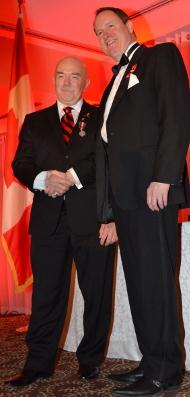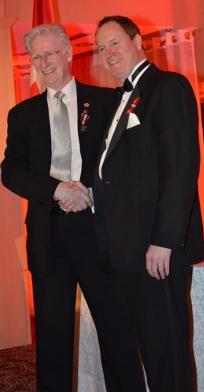
CAS board chair Albert McNutt is pushing for provincewide anonymous HIV testing in his native Nova Scotia. Credit: Bradley Turcotte
The AIDS Committee of Ottawa’s (ACO) first executive director, David Hoe, is among the recipients of the Queen Elizabeth II Diamond Jubilee medals. He received the award Nov 27 from the Canadian AIDS Society (CAS) for exemplary work and service in the field of HIV/AIDS.
Hoe immigrated to Canada from England more than 30 years ago; he says that when he began with ACO in 1987, he witnessed firsthand the devastation AIDS wrought on the city of Ottawa.
During his time with ACO, he helped the organization move from being a resource exclusively for gay men to becoming a vital service for HIV-positive women, aboriginals and injection drug users.
Jay Koornstra, the executive director of Bruce House, who received a Diamond Jubilee medal earlier this year through Ottawa-Centre MPP Yasir Naqvi’s office, says Hoe has been a mentor to him for years and is very deserving of the award.
“I immediately clicked with him when we met in the ’90s because of his attitude, the way he expressed himself and his care for people living with HIV,” Koornstra says. “I respect him and I’m glad to call him a friend. He’s had a tremendous influence on HIV/AIDS work.”
Looking ahead, Hoe would like to see the number of new HIV infections among gay men decline.
“It’s been slowly rising for 10 years. Most of the new transmissions that happen are from people that have recently been infected and do not know their status,” he says. “We’ve got to get that down.”
Medal recipient Darien Taylor has lived as an HIV-positive woman for more than 20 years. A co-founder of Voices of Positive Women, Taylor says it was not until two years after she discovered she was HIV-positive that she met another HIV-positive woman.
A true trailblazer, Taylor describes her early work around HIV-positive women as “machete hacking through the jungle.”
She stresses that although she has devoted her life’s work to HIV-positive women, she is not representative of the majority.
“The face of women with HIV is often a woman of colour who is trying to take care of a family, who’s dealing with immigration issues, who may be dealing with HIV in her family, who is economically disadvantaged,” she says. “All those issues are the face of a woman living with HIV now.”
Taylor, who also co-chaired AIDS Action Now, says she would not be where she is today without the assistance of gay men living with HIV and says their support is invaluable to HIV-positive women.
Bob Leahy, a positivelite.com contributing editor who tested positive for HIV in 1993, says he is overjoyed to be a medal recipient; he hopes that one day a cure for HIV will render websites like his own obsolete.
“There’s a distinct optimism that’s come in the last few years that at some point we can all go home and play and forget all these organizations and structures that we’ve built,” he says. “We can just return to living normal and complete lives without the stigma and without criminalization.”
On the topic of criminalization, and specifically the criminal prosecution of Steven Boone, Leahy says the community should support Boone.
“Criminalization is a blunt tool at the best of times. In the case of Boone, to lay attempted murder charges is entirely inappropriate,” he says. “It further stigmatizes. It characterizes the disease as something that kills, and science tells us it doesn’t. We should come together as a community and help our own.”
For CAS board chair Albert McNutt, helping his own is precisely why he is a recipient of a Diamond Jubilee medal. Diagnosed in 1986, McNutt fled rural Nova Scotia out of fear for what his diagnosis would mean for his family. Returning in 1991, McNutt founded the Truro AIDS Outreach Project to serve an HIV-positive population with little resources.
The project became the Northern AIDS Connection Society and has evolved to encompass sexual health services, working with youth and hepatitis C treatment and prevention.
McNutt is currently pushing for Nova Scotia to offer anonymous testing provincewide, as the service is currently available only in Halifax.
“We feel strongly about anonymous testing because to me that’s the way to go,” he says. “Especially now with criminalization; it is driving people to not get tested.”
McNutt says the recognition is a huge honour.
“Often people who do AIDS work, or any volunteer work, go unrecognized; the work goes unnoticed. It’s not that we do the work to get an award; we do the work because we are passionate and want to implement change,” he says.
Monique Doolittle-Romas, chief executive officer of CAS, is one of Canada’s top lobbyists and received a medal for her work around HIV/AIDS.
She says each recipient deserves recognition for championing the HIV/AIDS movement.
“From the early days, this is a community that responded very quickly when the epidemic started to hit across the world, and specifically in Canada,” she says. “These are the people who came together to make sure that services could be delivered, people who had HIV and AIDS were looked after, cared for and supported. They continue to be leaders, not only in Canada but internationally as well.”
Health Minister Leona Aglukkaq spoke at the gala, and NDP MP Olivia Chow conducted the fundraising auction alongside Tony Gundy.
CAS was given 30 medals, distributed by the office of the governor general, to award. Following an open call for nominations to all agencies working in the field of HIV/AIDS, nominees are scored on the number of years of service, their policy and advocacy work on a national, local and regional level and any innovations they have created. The review committee is made up of CAS board members and one staff member.


 Why you can trust Xtra
Why you can trust Xtra


